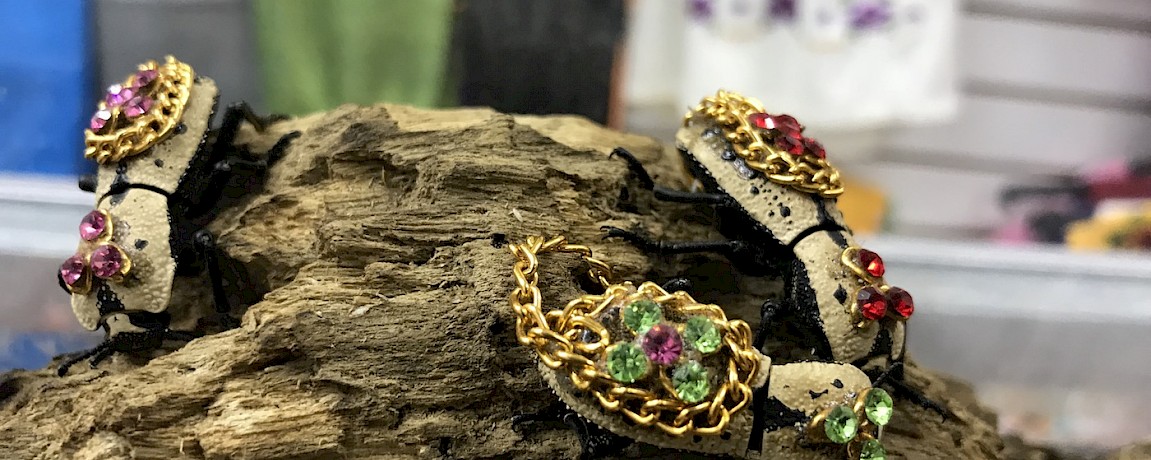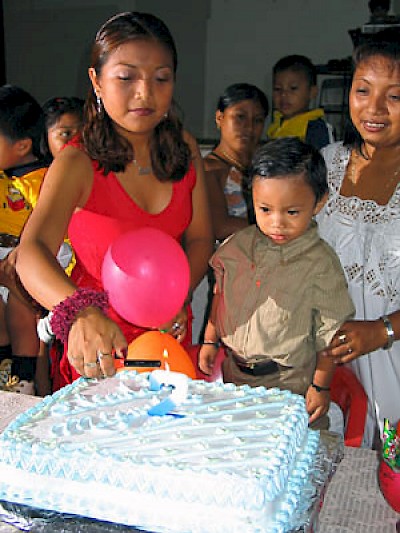What's in a (Spanish) Name?
If you aren't an aficionado of all things Mexican (which we weren't when we first moved to Yucatan), during your first few months of living here, you will meet people with names that are unfamiliar. Some of them are cute, some are funny and some are just downright odd.
Let's start with Spanish names. In our pre-Working Gringo days in California, we were familier with names like Jose, Jorge or Maria because California roots are, after all, Mexican. We suspect that perhaps many of the Mexicans we came in contact with may have adopted these more normal Spanish names to make life easier for themselves.
Upon immersing ourselves in Yucatan, we were confronted with names like Socorro, Izauro, Santiago and Ignacio... names that were definitely new to us. Some of these names (like the ones just mentioned), we found rather beautiful. Working Gringa's Spanish name is Elena, yet another beautiful name. But Working Gringo's name translated into Spanish has not been quite so painless. While "James" is a perfectly fine name in English, the Spanish version of James (pronounced "Hah-mess") is rather uncommon and not quite so pleasing. What's more, the alternative of Jaime always raises a chuckle from our Spanish-speaking friends - we're not sure why. Apparently, Santiago also means "James" and Working Gringo has found that much more amenable.
Of course, if you don't like your name, there is always the option of a nickname. Nicknames are popular here, but connections to their antecedents have not always been obvious to us. Here are some Mexican nicknames that we have run across and the "given" names that they are related to:
- Jesús (a common name here) becomes Chucho
- José becomes Pepe
- Ignacio becomes Nacho
- Socorro becomes Soco or Coco
- Maria Elena becomes Malena
- Eugenia becomes Genny (pronounced "Henny")
- Beatriz becomes Betty
- Concepcion becomes Conchi
- and so on...
Then there are the stranger dimunitives. There is a popular hardware store in the Yucatan named Boxito. From our Mayan language studies, we have learned that box means "black" and the Spanish suffix -ito means "little". As it turns out, we were right! Boxito is a nickname given to a little guy who has dark skin. It is a dimunitive name, given out of affection or familiarity, not out of disrespect. And it was probably the nickname of the man who started this very successful chain of stores. Other dimunitives in that vein are Flaco (skinny man), Gorda (fat female), Gordita (little fat female), Guera (white woman), Guapo (handsome man), Rubia (blonde woman). And of course, just change the "a" to "o" or vice-versa, and the name gets a sex change. Fun and easy!
While we're on the subject, the habit of adding dimunitives to names is a charming one and we're not sure how we lived without it before now. Mama becomes mamacita, abuelo becomes abuelito, gata becomes gatita and the list goes on ad infinitum. If you work at it hard enough, you can add -ito or -ita to almost anything and that thing is suddenly little, cute and endowed with charm and endearment. Of course, this is also used for names: Lupe becomes Lupita (at least one cafe in every town in Mexico is Cafe Lupita), Estrella becomes Estrellita, Angel becomes Angelito, etc.
But our favorites are the names we would never have thought of in a million lifetimes. Our assistant, the Amazing Beatriz, has told us about people she has met (more than one!) named Annirev. We pondered over that for a few minutes when we heard it but she finally had to tell us that it is the abbreviation for Anniversaire de Revolución (The Anniversary of the Revolution), which is the way the holiday on November 20 is often presented on a calendar.
We ourselves have met more than one young woman named Leydi Diana. All the Leydi's we have met seem to be in their early twenties... hmmm! Certainly not a coincidence.
The Amazing Beatriz also told us about a story she read in the local paper a few years back. There was a local whose name was Onecent (pronounced "OHN-neh-sent"). We puzzled over this one too but she told us not to bother. The story was that the father of Onecent had been out in the milpa (corn field) one day, and he had found a coin on the ground. On it, the coin had the letters ONE CENT and when his son was born later that day, he was so named. He could have been named Ingodwetrust ("een-gohd-WAY-troost") but that probably didn't trip off the tongue quite so lightly.
When we were researching this article, we found a story from last summer about the Mexican government cracking down on "strange" baby names, trying to save their little citizens (paisanitos?) from future embarassment in the schoolyard. Apparently, inventive names are a Mexican tradition and a custom that we think is rather endearing. Adorable. Charming. It's a customita! (Okay, so it doesn't work all the time...)
Have you heard any interesting names here in the Yucatan? Please tell us... we're fascinated!









Comments
Grant 18 years ago
My favorite Merida name is Floricel (man's name). Floricel couldn't account for it except to say his parents liked the sound, so that's all that was required.
Nobody can pronunce my name, of course. They make it through the "Gran" part ok, but something about two consontants together in the same syllable makes the final "t" impossible. I stopped quibbling about it early on.
Also strange is what happens to your name as shown in your US passport. As noted by other commentators, the normal hispanic name format is First Name, Father's Surname, Mother's Surname. A US passport has First Name, Middle Name, Last Name. So people at the bank, say, will look at your passport and address you as Mr. (Middle Name). The first couple of time this happens, it seems very odd.
Reply
maria 18 years ago
well -- with a name like "maria," people pause and wait for me to add the next name. always. because maria is so lonely alone. some days i'll add something just because i feel like it but then i have to remember who i said what to. so, i've been thinking about developing an alter ego.
lately, much to my dismay, many people have begun calling me the yucatecan nickname for "maria," which is "mari". are there too many syllables in maria i wonder? or does everyone just need a nickname?
Reply
Carlos Daniel Gallegos 18 years ago
Spannish names are wonderful. My mom, being white anglo saxon, with some Cherokee, from South Carolina, named me: Charles Daniel. After an uncle of hers. Gallegos is my fathers family name. Names given in mexico is different from anglo-saxon (USA)roots. Both father and mothers family names are represented. My wife is: Adlemy (1st) Ariadna (middle) Caceres (fathers family name) Caceres (mothers family name). Then she married me, and my family name was added as: de Gallegos. (5 names wow) Of course my wife just go by: Ariadna Caceres de Gallegos. When I moved to Merida I changed my 1st name to the spannish, Carlos. And, said my middle name, Daniel in spannish. So, U say my name in espanol: Carlos Daniel Gallegos, sounds more beautiful.
Reply
CasiYucateco 18 years ago
Unusual names I have come across in Yucatan:
Neftaly
Eleutario "Ay-lay-OO-tar-ee-oh" (so many vowel sounds!)
Maverick (from the TV show?)
Maximilianna (after the emperor?)
Reply
manuelito 18 years ago
A friend of mine told me this storie about two mexican indians who did not speak spanish well. When they took their son to have him baptized in church the priest asked what is the name you would like to give to your son?. And both answered "USEBIO", (trying to say "EUSEBIO") and the priest said no it is not Usebio, it is with an "E", referring to (EUSEBIO). The two indians said it was fine so, they baptized him "WITH AN E", and the kid was from then on called "with an E", in spanish "CON"E", sounds funny. jejej. If you hear someone to be called "con-e", now you know why. bye.
by the way i am short that's why my name in this page is manuelito.
Reply
Francisco 18 years ago
The custom is not only mexican it's quite latin american. In Venezuela there are a great deal of very strange names. And in the western part of the country a lot of locals name their kids after famous people in history. More than individual I know is called "Jefferson" and another "Woody Allen"
Diminutives are commonly used with the name Maria (since there are sooo many Maria, the second name is tacked on to the first). This Maria Fernanda becomes Mafer (mah-fair), Maria Paulina becomes Mapa (mah-pah), Maria Soledad beomes Marisol (mah-ree-sole), etc.
Perhaps the strangest name of them all is usnavi (oos-nah-vee). Which is basically US NAVY, because that's what's etched on the side of USN warplanes which is clearly visible when they fly low.
Reply
sarah 18 years ago
In Merida I have always been Sarita. Or sometimes my family calls me Saronga. My one uncle calls me Sarajevo...And my Mayan nickname is Sarach.
Great article!! :^)
Reply
Lizbeth Aurora Gallegos 18 years ago
This is one of the funniest articles I have read, and it is so true the way people in Yucatan like to find out what your name is so they can start calling you by its variant, for instance my second name is Aurora, but there I was called Bora insted of Aurora, or Borita, instead of Aurorita. People who knew me by my first name never called me Lizbeth, but rather Liz or Lizita, always adding the diminutive at the end of my name. I think it is an adorable an sweet tradition.
Thanks for the article Working Gringuitos.
Regards,
Lizita.
Reply
Working Gringos 18 years ago
Nancy,
We have asked around and "Nancy" is a common name here in Mexico and is pronounced the same. So you're already Mexican!
Reply
Malcolm 18 years ago
Malquito.
Reply
DC 18 years ago
Great story! I have been travelling through Mexico, Central and Latin America for many years and have also heard alot of "interesting" names for just about everything from people to animals to locations. Gotta love our friends to the South.
On the note above about the name Santiago translating to James, you're right on. "Santiago" was originally referred to Saint James the Great, who brought Christianity to Spain and the Iberian Peninsula.
Later, "Santiago" became the common Hispanic reference for Saint James, the brother of Jesus.
On a more local note, in many historical references about the Texas Revolution, Colonel James Bowie is frequently called "Santiago" by the Mexican locals under his command, including Captain Juan Seguin (this was also carried into the movie 'The Alamo').
Keep the great info coming and see you soon.
Reply
« Back (80 to 91 comments)Next »